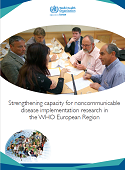Strengthening capacity for noncommunicable disease implementation research in the WHO European Region (2019)

Download
Calls for greater implementation research (IR) capacity came in the wake of compelling evidence that implementation strategies are critically important for the dissemination and facilitation of evidence-informed policies and interventions to tackle noncommunicable diseases (NCDs), thereby improving outcomes for both individuals and populations. However, at present, implementation of evidence-based interventions and policies is challenged by a gap in lack of academic research on how these cost–effective recommended interventions can be implemented in the context of local settings, especially those of low and middle-income.
WHO Member States have committed to cutting premature noncommunicable disease (NCD) mortality by one third by 2030 under Target 3.4 of the Sustainable Development Goals. WHO has produced a menu of cost–effective NCD interventions, ‘Tackling NCDs: “best buys” and other recommended interventions for the prevention and control of NCDs (2017), to help achieve this target. However, in the danger of not meeting this target in time, monitoring data suggests that only 42% of these ‘best buy’ NCD interventions have been fully implemented across the WHO European Region. Countries will not be able to achieve the nine global voluntary targets for NCDs nor SDG Target 3.4 if “business as usual” continues; there is a need to scale up and improve uptake of affordable and efficient NCD interventions.
In February 2019 a four-day Implementation Research workshop was held bringing together key stakeholders in the academic and policy-making communities to initiate discussions among them on ways to strengthen IR capacities for NCD prevention, control and promoting health through the life-course. Twelve countries participated: Azerbaijan, Belarus, Croatia, Estonia, Finland, Kazakhstan, the Kyrgyz Republic, Malta, the Republic of Moldova, Montenegro, the Russian Federation, and the United Kingdom and with support of technical experts and WHO staff each country developed an IR project for a specific NCD challenge in their country. This report provides an overview WHO/Europe’s approach to implementation research, the content of the workshop, workshop findings, and highlights IR project proposals developed by each Member States during the four days. WHO looks forward to the continued development of each of these proposals and is continuing to provide technical expertise and support to each.



